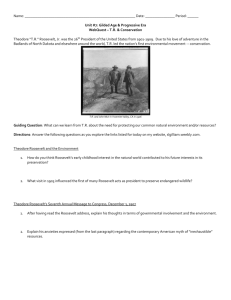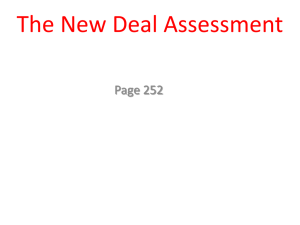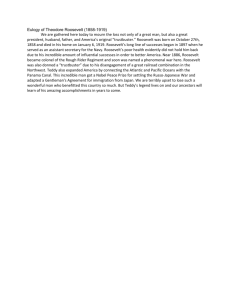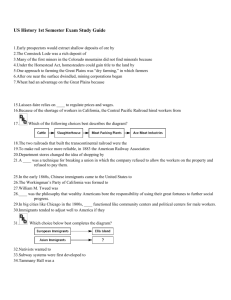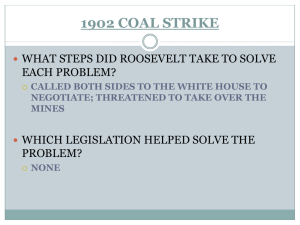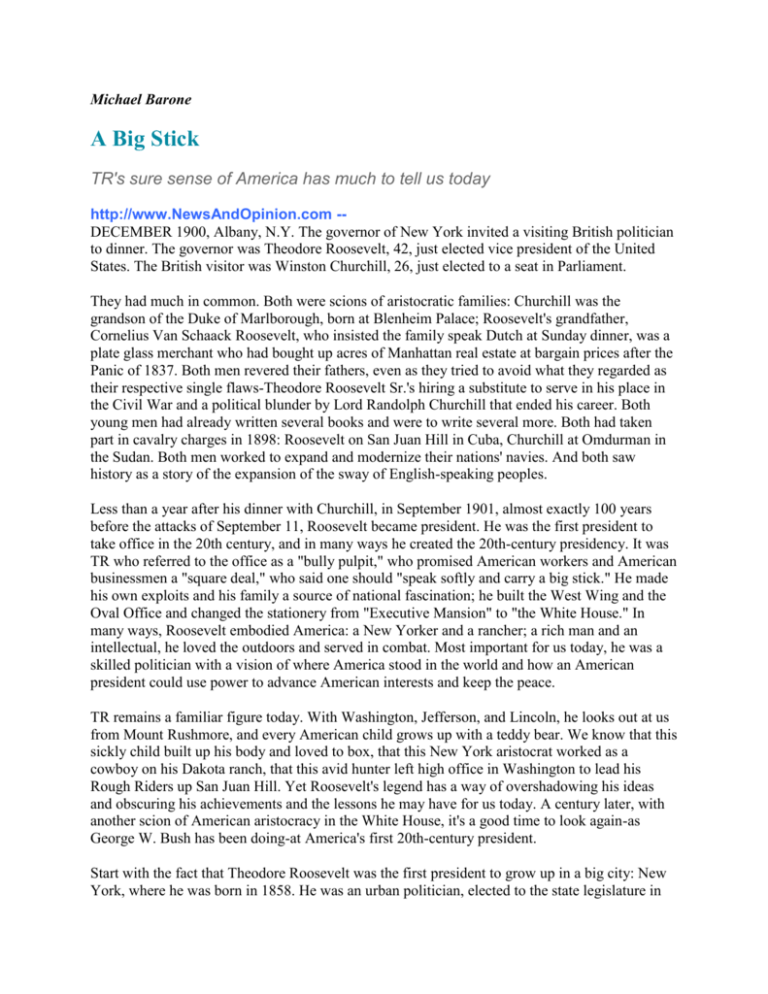
Michael Barone
A Big Stick
TR's sure sense of America has much to tell us today
http://www.NewsAndOpinion.com -DECEMBER 1900, Albany, N.Y. The governor of New York invited a visiting British politician
to dinner. The governor was Theodore Roosevelt, 42, just elected vice president of the United
States. The British visitor was Winston Churchill, 26, just elected to a seat in Parliament.
They had much in common. Both were scions of aristocratic families: Churchill was the
grandson of the Duke of Marlborough, born at Blenheim Palace; Roosevelt's grandfather,
Cornelius Van Schaack Roosevelt, who insisted the family speak Dutch at Sunday dinner, was a
plate glass merchant who had bought up acres of Manhattan real estate at bargain prices after the
Panic of 1837. Both men revered their fathers, even as they tried to avoid what they regarded as
their respective single flaws-Theodore Roosevelt Sr.'s hiring a substitute to serve in his place in
the Civil War and a political blunder by Lord Randolph Churchill that ended his career. Both
young men had already written several books and were to write several more. Both had taken
part in cavalry charges in 1898: Roosevelt on San Juan Hill in Cuba, Churchill at Omdurman in
the Sudan. Both men worked to expand and modernize their nations' navies. And both saw
history as a story of the expansion of the sway of English-speaking peoples.
Less than a year after his dinner with Churchill, in September 1901, almost exactly 100 years
before the attacks of September 11, Roosevelt became president. He was the first president to
take office in the 20th century, and in many ways he created the 20th-century presidency. It was
TR who referred to the office as a "bully pulpit," who promised American workers and American
businessmen a "square deal," who said one should "speak softly and carry a big stick." He made
his own exploits and his family a source of national fascination; he built the West Wing and the
Oval Office and changed the stationery from "Executive Mansion" to "the White House." In
many ways, Roosevelt embodied America: a New Yorker and a rancher; a rich man and an
intellectual, he loved the outdoors and served in combat. Most important for us today, he was a
skilled politician with a vision of where America stood in the world and how an American
president could use power to advance American interests and keep the peace.
TR remains a familiar figure today. With Washington, Jefferson, and Lincoln, he looks out at us
from Mount Rushmore, and every American child grows up with a teddy bear. We know that this
sickly child built up his body and loved to box, that this New York aristocrat worked as a
cowboy on his Dakota ranch, that this avid hunter left high office in Washington to lead his
Rough Riders up San Juan Hill. Yet Roosevelt's legend has a way of overshadowing his ideas
and obscuring his achievements and the lessons he may have for us today. A century later, with
another scion of American aristocracy in the White House, it's a good time to look again-as
George W. Bush has been doing-at America's first 20th-century president.
Start with the fact that Theodore Roosevelt was the first president to grow up in a big city: New
York, where he was born in 1858. He was an urban politician, elected to the state legislature in
1881, at 23; an unsuccessful candidate for mayor; a successful (and well-publicized) police
commissioner in 1895. New York grew from 800,000 to 3.4 million when he became president;
immigrants, increasingly from the unfamiliar cultures of southern and eastern Europe, were
arriving in huge numbers-3.7 million in the 1890s, 8.2 million in the decade of his presidency.
Roosevelt was aware, as we are today, that cities can be the site of terrorist violence. He came to
office because his predecessor, William McKinley, had been assassinated by an anarchist (as had
the president of France in 1894 and the empress of Austria in 1898). He often voiced his hatred
of anarchists and revolutionaries. His biographers tend to regard this as an annoying tic, a bit of
crankery; "to Roosevelt, anarchy was the wolf perpetually at the door," one wrote. But Roosevelt
knew that civil order could be destroyed by armed revolution. Draft riots had raged in his New
York neighborhood in 1863. The year he ran for mayor, 1886, was the year of the Haymarket
Square bombing in Chicago. Federal troops had been sent in to quell violent strikes in 1877 and
1894. During his presidency, he watched with foreboding as Eugene Debs's Socialist Party
increased its share of the vote in 1904, and as the former governor of Idaho was killed by a bomb
set off, prosecutors said, by an agent of a militant labor union. He feared violent revolution and
understood that it could produce totalitarian regimes, as indeed happened in other countries in his
lifetime. "If ever anarchy is triumphant," he said in his first State of the Union address, "its
triumph will last for but one red moment, to be succeeded for ages by the gloomy night of
despotism." He pushed through laws to reduce the power of great corporations and supported
nonviolent labor unions in part to forestall revolution and radical socialism. To his conservative
critics he said, "The only true conservative is the man who resolutely sets his face toward the
future." It is an argument George W. Bush might make for his compassionate conservatism.
Roosevelt was the first president to use the newly emerging media of the day to tell his story, and
it was a fascinating one. He came from one of Gilded Age New York's richest families, at a time
when most rich people avoided public service and politics. He hunted buffalo and raised cattle in
the West after leaving New York following the deaths of his mother and first wife on the same
day in 1884. He wrote scholarly books-The Naval War of 1812, still the standard work today;
Hunting Trips of a Ranchman, about his ranch in the Dakota Territory; and the six-volume The
Winning of the West.
In the process he developed a vision of the United States as a great power with interests around
the world. The Winning of the West, published when he was 30, begins with an overview of the
movement of the world's peoples in Europe and around the globe. Like Churchill, he saw as
almost miraculous the rise of the English-speaking peoples to world leadership. He was an
admirer and friend of Capt. Alfred Thayer Mahan, whose 1890 book, The Influence of Sea
Power Upon History, argued that naval power determined the fate of nations. (Roosevelt was not
much of a sailor himself; he got seasick on ocean voyages and preferred strenuous rowing to the
sailing that his cousin Franklin Roosevelt loved.) He believed that America, fronting on two
oceans, must have a strong navy. The Naval War of 1812 begins with a call for the building of a
much larger navy.
And so it was with pleasure that he took up duties as assistant secretary of the Navy in 1897, the
more so because Navy Secretary John D. Long was given to frequent absences. On Friday, Feb.
25, 1898, Long was exhausted and decided to leave the office early. This was 10 days after the
Maine was blown up in Havana harbor and while President McKinley was trying to avoid war
with Spain. When Long went home, Roosevelt went into a flurry of activity. He ordered
Commodore George Dewey to take his squadron of ships to Hong Kong and to keep them stoked
with coal and ready to sail to Manila, the capital of Spain's Philippines. He repositioned ships in
the Atlantic so that they would be prepared to converge on Cuba. He ordered enough coal and
ammunition for a war. He placed docked ships on alert, ready to sail at a moment's notice. In one
afternoon he prepared the Navy to fight the Spanish-American War, which started, despite
McKinley's efforts, in April.
By that time Roosevelt, eager for the combat his father had avoided in the Civil War, was
inveigling his way into the Army. He got permission to raise a division of volunteers; he
succeeded, and the Rough Riders, made up of Western cowboys and Eastern Ivy Leaguers,
proceeded to the embarkation port of Tampa. There Roosevelt pulled strings to get the Rough
Riders on a ship, and they finally made the famous charge up San Juan Hill-famous, because he
made sure to get thorough press coverage. Back in New York by summer, he was approached by
Republican bosses to run for governor; he campaigned with Rough Riders in uniform and,
despite local Republican scandals, won a narrow victory. Roosevelt, like most governors of New
York, wanted to be president and hoped to be elected to succeed McKinley in 1904. But
Republican Party bosses, fearful of his independence, managed to kick him upstairs to the vice
presidency-an office with so few duties that Roosevelt spent most of his time at his trophystuffed house in Oyster Bay, on Long Island.
Then, on Sept. 14, 1901, eight days after he was shot, William McKinley died and Theodore
Roosevelt became president. He promised to follow McKinley's policies and concentrated on
domestic issues. But he intervened in the economy in ways McKinley never had. In 1902 he
brought the first highly publicized case under the antitrust law passed in 1890, the Northern
Securities case, to break up a combination of three northwestern railroads. It was successful and
the precedent for other "trustbusting." Also in 1902, he mediated the strike by the United Mine
Workers of the anthracite coal mines. By threatening behind the scenes to have the military take
over the mines, he got a settlement and averted a heating-coal shortage in the winter. Unlike
previous presidents, he proposed laws regulating the economy and pushed them through
Congress-a ban on railroad rebates to big shippers, railroad rate regulation, inspection of
meatpacking plants, the Food and Drugs Act. And he promoted conservation as no other
president had, establishing many new national parks and national monuments. But he was not
single-minded on the subject: His Forest Service also opened up national forests for logging, and
his Reclamation Bureau built dams to provide water for farmers.
But what was most important about Theodore Roosevelt is that he was the first American
president to see the United States as a great world power and to act accordingly. The SpanishAmerican War gave the United States new overseas possessions. From the peace treaty with
Spain the United States obtained Puerto Rico and the Philippines, obvious sites for naval bases;
Cuba became independent but with special treaty rights reserved for the United States; Hawaii,
and thus Pearl Harbor, were annexed during the course of the war. In the years that followed,
Roosevelt proceeded systematically to advance American interests. He worked to strengthen the
Monroe Doctrine of 1823, which declared that the United States would not allow European
nations to make territorial gains in the Western Hemisphere. He believed the Pacific, with all its
possibilities for trade, was of vital interest to this country. And he understood the lesson that the
20th century would painfully teach: that the United States had an interest in preventing the
outbreak of a war between the great powers in Europe.
His first major initiative was the Panama Canal. For decades there had been proposals to build a
canal across Central America, to connect the Atlantic and the Pacific. The British had thought
about it; the French had tried and failed; Americans would succeed. In 1902 the chief focus was
on building a sea-level canal through Nicaragua. But Roosevelt feared it would be too small for
big ships. He wanted a canal across the mountainous isthmus of Panama, then part of Colombia.
He signed a treaty with Colombia, on what he thought were generous terms, but it was rejected
unanimously by the Colombian Senate. Seething, he began working with Philippe Bunau-Varilla,
a mysterious Frenchman representing the French Panama Canal company. Bunau-Varilla was in
touch with Panamanians who wanted to trigger a revolt against Colombia; in October 1903 he
told Roosevelt about the plans, which Roosevelt was careful not to approve but even more
careful not to discourage. The revolution was proclaimed Nov. 3, 1903; U.S. ships stood nearby,
and troops landed, forestalling the Colombian military; on November 6, when a cable arrived
from the U.S. counsel, the United States recognized the independence of Panama. On November
18, Secretary of State John Hay and Bunau-Varilla, now representing Panama, signed a treaty
allowing the United States to build its canal. The Panama Canal was not completed until 1914,
but Roosevelt regarded the engineering marvel as the greatest achievement of his presidency.
Another great achievement was the making of peace in what would have seemed to previous
presidents a distant conflict, the Russo-Japanese War of 1904. But in Roosevelt's view America
had important interests throughout the Pacific. One was trade with China: European powers and
Japan were securing exclusive trade zones in China's ports, and in 1899 John Hay called for an
"open door," to allow U.S. traders in on an equal basis. To this Russia was a threat: It was just
finishing its trans-Siberian railroad, and Russian troops occupied the main ports of Manchuria.
Roosevelt saw Japan, then an ally of Britain, as a counterweight. He was worried as Russia
sailed its Navy from the Atlantic across the Indian Ocean to the Far East; he cheered when Japan
destroyed it in the Battle of Tsushima in May 1905. But he did not want Japan to be too powerful
either. Working through Japanese envoys in the United States (it helped that one of them was a
Harvard man), and maneuvering to influence the Russian czar through the czar's cousin, the
emperor of Germany , Roosevelt managed by August 1905 to convene a peace conference in
Portsmouth, N.H. Infuriated by the Russian envoys' duplicity, Roosevelt nevertheless pressured
Japan to make concessions and, after three weeks of negotiations, got both sides to agree to the
Treaty of Portsmouth. For this achievement the president who gloried so in his role as armed
combatant was awarded the Nobel Peace Prize.
Roosevelt was a foreign-policy realist. Like Niccol� Machiavelli and Henry Kissinger, and
unlike his successor Woodrow Wilson, he believed that America's foreign policy should be
governed not by abstract moral principles but by a clear-eyed pursuit of its national interests. As
he wrote to one confidant, "Two nations with violently conflicting interests may each be entirely
right from its own standpoint." To preserve its interests, America must maintain military
strength: "You do not get peace by peace," he once said; "you get peace as the result of effort."
But America should also be prudent in its use of force: The same Roosevelt who worked so hard
to force war on McKinley showed much more caution when he had the responsibility of
leadership. After Panama, he advanced what he called the Roosevelt Corollary to the Monroe
Doctrine: Foreign powers should not send troops to enforce their rights against bankrupt Latin
American nations (as Germany tried to do in Venezuela in 1902); the United States would send
in troops to enforce those rights instead (as Roosevelt did in the Dominican Republic in 1904).
After Portsmouth, at Kaiser Wilhelm II's urging, he got France and Britain to agree to a
conference in Algeciras, Spain, to consider Germany's complaints against French domination of
Morocco; then, mediating from Washington, by threatening to publish their diplomatic
correspondence, he pushed the Germans into a face-saving agreement; he acted quietly, without
publicity, in order to avoid what he believed would be a "world conflagration."
Which is exactly what came in 1914. No subsequent president, in Kissinger's estimate, has been
as pure a realist as Theodore Roosevelt, as determined that moral standards appropriate to
behavior at home do not apply to states that must act to protect their interests. He had scorn for
treaties that purported to prevent war even as he engaged in subtle and skillful diplomacy to
make or preserve peace. He understood that the United States could not produce democratic
government or protect human rights everywhere, even as he worked to see that Latin American
governments fulfilled their international obligations and orchestrated American protests of
czarist Russia's anti-Jewish pogroms. One can see in George W. Bush's rejection of the Kyoto
and ABM treaties something of Roosevelt's insistence that the United States pursue its own
interests, even if it means acting unilaterally, rather than bowing to the sentimentality of highminded critics at home and abroad.
Since his first year in office, Roosevelt had worked quietly to build up American naval strength:
As Britain, Germany, and Japan built more giant battleships, so too did the United States. As his
second term was drawing to a close, Roosevelt ordered the U.S. fleet to be painted white and to
sail around the world. As the Great White Fleet steamed out of Norfolk harbor, Roosevelt, in the
presidential yacht, Mayflower, said, "Oughtn't we all feel proud?" It was the first time any fleet
had sailed around the world-a dramatic demonstration that the United States was now, suddenly,
a front-rank world power. In February 1909, his last full month in office, Roosevelt went out into
the Atlantic to watch the fleet come home. As the 7-mile-long line of ships cruised by, firing off
21-gun salutes that lasted an hour, he said, "This is the first battle fleet that has ever
circumnavigated the globe. Those who perform the feat again can but follow in your footsteps."
Could he have been looking over the horizon to a century later, when the United States would be
the world's single great power?
Roosevelt's life in his 10 years as an ex-president was less happy. Restlessly, he hunted in Africa
and paid calls on the capitals of Europe; he split with his successor, William Howard Taft, and
with his Republican Party. But he detested Woodrow Wilson, who won the presidency in 1912,
and bitterly criticized his policy of neutrality in the first three years of World War I. When the
United States entered the war, Roosevelt begged Wilson to allow him to raise his own division
and serve on the front in France. Wilson, politely but firmly, refused. There was talk that
Roosevelt might be the Republican nominee for president again in 1920, and if so, he surely
would have won. But, weakened by diseases and injuries contracted in his strenuous travels, he
died in January 1919. He was 60. One cannot help wondering whether Roosevelt, with his
demonstrated skill at conducting diplomacy with the German kaiser and the Russian czar, might
have succeeded where Wilson failed in negotiating a peace in the early years of World War I.
One cannot help wondering whether Roosevelt, as president in the 1920s, would have avoided
the treaties limiting the U.S. Navy and outlawing war as an instrument of policy signed by his
Republican successors. Wouldn't he surely have maintained the American military strength and
diplomatic involvement in Europe that might have laid the groundwork for another American
president to frustrate Hitler's schemes in the next decade?
Theodore Roosevelt had a sense of the tides of history that would sweep the 20th century-and the
21st. There was his loathing for terrorism, anarchism, and revolution. He had a foreboding of the
horrors that totalitarian governments would wreak in the century ahead. His insertion of
American power into distant situations was aimed at preventing an imbalance of power that
could lead to war between great nations: For all his personal love of combat, he intuited the
bloodshed that would be brought by World War I and World War II. Roosevelt sought to instill
in his fellow citizens a robust national pride and a sense of common purpose, a willingness to
sacrifice if need be for the good of all. Hatred of totalitarianism, horror of war, national pride and
purpose: good guideposts for American presidents in the 21st century, as they were in the 20th.






